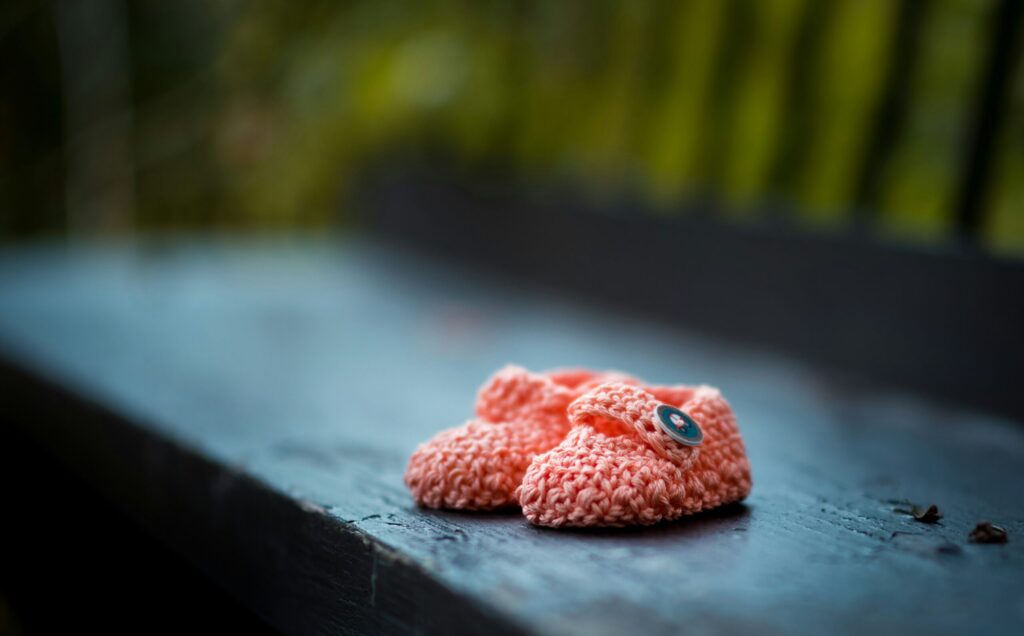
The mother who lost her child to adopters who promised an open adoption only to cease all communication after several years. The girls whose children’s births were not registered to hide the age of the mothers and identities of the fathers. The woman was coerced into an abortion by a partner or provider. The once-ten-year-old mother who called the result of her sexual abuse a sibling to avoid family scandal.
At first glance, these situations seem entirely unrelated. And yet, after talking to folks with stories all too similar to them in my circle of fellow exploitation survivors, the common thread that weaves them together is the fact that they can’t talk about their stories of pregnancy and loss. They have experienced what I would call disenfranchised pregnancy and infant/child loss. They are so silenced that I cannot even find articles to corroborate the more complex, unique iterations of pregnancy and child loss outside of the norm such as child harvesting in baby factories, but I assure you that they do happen. As long as something is biologically and humanly possible, I ask that you keep an open mind to the reality of it as you continue reading this article.
While this article is intended to help service providers such as physicians, mental health professionals, and social workers better support those they serve who have this painful history, anyone who works with survivors of exploitation, is interested in being an ally to this community, or has lived experience with pregnancy and child loss that falls outside what our society considers the norm can benefit from the information below.
What Is Disenfranchised Pregnancy and Child Loss?
The typical flowchart for reproduction is consensual sex→positive pregnancy test→contact with a medical provider→consensual abortion or continued pregnancy→birth→parenting or freely chosen adoption. When someone has experienced pregnancy outside of this chain of events, such as pregnancies that result in illegal adoptions in human trafficking or losing a child through system involvement, they are often excluded from public and private conversations around reproduction and grief.
One possible overarching label for this constellation of underrepresented public health issues could be “Disenfranchised Pregnancy.” Disenfranchised pregnancy (DP) refers to reproductive experience(s) that cannot be acknowledged openly due to social stigma, taboo, deviation from the typical narrative, unconventional circumstances, or other marginalizing factors. This term would be a play on the idea of “disenfranchised grief,” conceptualized by Dr. Kenneth J. Doka in 1989.
According to speakinggrief.org, disenfranchised grief describes an individual’s “experience when they incur a loss that is not or cannot be openly acknowledged, socially sanctioned or publicly mourned.” Reproductive experiences that cannot be acknowledged in public due to social stigma, taboo, a significant deviation from the widely accepted norm, unusual aspects, or other marginalizing factors. Using these two terms together, we can begin to discuss the multifaceted emotional and psychological impact of having pregnancies that are not allowed to be openly acknowledged and the losses of fetuses, infants, and children that may be less socially acceptable to mourn.
Since disenfranchised pregnancies often occur as a result of socially taboo events like rape, incest, “hookups” or sex outside of marriage/relationship, and gender-based violence, the first step to preventing these kinds of pregnancies and losses is recognizing not only disenfranchised pregnancies but also the issues that cause survivors to feel shame about acknowledging the pregnancies even to themselves. If we never talk about it, we will never know the scope of the problem or be able to develop services that care for those who keep something as significant as going through pregnancy or losing a child to themselves for fear of social stigma and other consequences.
Disenfranchised pregnancy is nothing new. The “girls who went away” in the “Baby Scoop Era” to residential homes that acted more like prisons bent on stealing the babies of vulnerable women have started coming forward half a century after their children were relinquished or downright taken from them. They were told that they would forget. They did not. How could a mother forget a typical birth of her child, let alone one that ended in her child being ripped from her forever? As these women looked for records that could point them in the direction of where their lost children might be, they sometimes learned that the only ones who forgot their separation from their child were the institutions that acted as the backdrop of the worst day of their lives, as searches for their information came up empty.
Before you think that prison-like, exploitative mother and baby homes are a thing of the past, listen to this woman’s heart wrenching story. With DNA testing and tireless internet searches, some mothers have reunited with their children and experienced complicated conclusions to their stories due to the trauma the loss caused to both mothers and children. These mothers not only lost their infants but also the opportunity to parent the child that was rightfully theirs to love and know if they so choose. The children, likewise, were thrown into a confusing situation where they would have to navigate the conflicts of their families of origin, adoptive families, and personal struggles upon discovering that much of what they were told surrounding their early life may have been a lie. The trope of the addicted, unstable birth mother may point to the fact that losing one’s child and being told that one should be grateful for the loss or move on would be enough to drive anyone to the brink of madness.
Our society has tended to keep taboo pregnancies and infant losses under wraps even outside of the relatively organized Baby Scoop Era. It took DNA testing to become widespread for us to understand the prevalence of children born through incest. The mothers whose infants were brutally murdered in the Tuam mother and baby homes stayed silent along with the children who survived until one brave historian brought their human rights violation to light. Let us not forget the unacknowledged, untold number of infant and child deaths that happened inside the boarding schools that effectively stole Indigenous children from their families from the early 1800s to the late 1960s in North America.
As a someone who has known far too many people who are and were affected by disenfranchised pregnancy and related losses, I don’t want us to have to wait twenty-plus years to start telling those stories. By then, the babies who were born of disenfranchised pregnancies will be adults with their own struggles and pain. Those who have gone through disenfranchised pregnancy may have carried the hefty burden of truly unspeakable trauma for so long that their broken bodies and spirits may never fully recover from the crushing weight. This heartbreaking prospect is preventable, but only if we band together within the anti-trafficking movement to prioritize addressing this multifaceted problem that affects multiple generations within fractured family structures.
I have my own story, too–one that I cannot tell until there is more awareness of these disenfranchised reproductive experiences/losses and I can join a chorus of voices who will dare to speak the unspeakable. The only way that survivors may feel empowered to attest to the grim reality of this issue is if their communities, service providers, and scholars who serve as allies to legitimize disenfranchised pregnancy in the social and health sciences, in particular, make space for us. Until then, we risk being disbelieved, disempowered, and further disenfranchised if we bring the source of our pain to light.
What Can Service Providers Do for Disenfranchised Pregnancy Survivors?
- Don’t dismiss our experiences as medically impossible or signs of mental illness
- Do consider the social factors that would have made our disenfranchised pregnancy experiences possible
- Don’t further silence us by shutting us down
- Do make space for open communication and provide trauma-informed care
- Don’t ask for details we are not ready to share
- Do earn our trust, let us know what information would be medically beneficial for you to know, and ask “yes” or “no” questions when we can’t talk about it
How Do We Make Space for Disenfranchised Pregnancy Survivors?
Listen to our stories and believe us. The only way we end the marginalization of people who experience pregnancy outside of our understanding of how reproduction should go is by normalizing the reality that many people do not get the luxury of fitting into the standard paradigm we’ve developed as a society for reproduction.
Sometimes, educating yourself is enough to make a difference for those you encounter in your work and everyday life who have a uniquely marginalized experience. To quote Emily Eisler, a Wellness Coordinator for YAMT, Inc. with a background in perinatal mental health, “It’s crucial for healthcare providers and mental health professionals to understand this issue so as to not contribute to the already strong stigma surrounding it. This can be achieved by learning about disenfranchised pregnancy as well as maintaining empathetic and nonjudgmental relationships with their patients and clients.”
A natural response to hearing overwhelming information is denial. When your mind tells you to block out our accounts and stop listening, take a deep breath, take a short break, and let us know that it is not our fault that you are not ready to hear what we have to say. Then, seek out information on how pregnancy, infant and child loss, and human trafficking intersect at your pace.
No one can hold space for heavy topics like this alone, so you should also surround yourself with trauma-informed providers who can support you and those you serve as you move forward into uncharted territory for caring for survivors of human trafficking and exploitation. Create spaces where we are safe to grieve, cry, reminisce, and remember. Most importantly, ask for what we as need as individuals to recover as best we can from something that changed the trajectory of our lives forever.
What are your thoughts on disenfranchised pregnancy?
How do you plan on supporting folks who have experienced disenfranchised pregnancy or loss in your practice and life?
Please share below!

